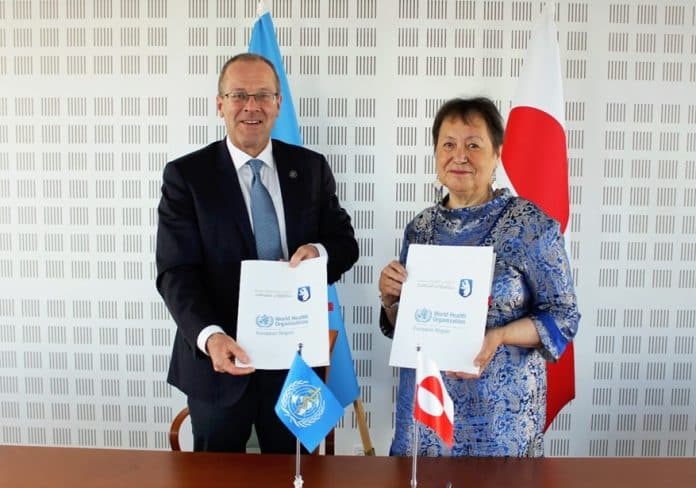Greenland and WHO/Europe have signed a 5-year memorandum of understanding (MoU) laying out 10 priority areas for collaboration and exchange in the field of health.
“I had the pleasure of visiting Greenland last year and saw first-hand how the health system there provides vital health services across a vast geographic area that is sparsely populated,” said Dr Hans Henri P. Kluge, WHO Regional Director for Europe, at the signing ceremony at WHO/Europe’s head office in Copenhagen today.
“The Inuit culture of Greenland holds ancient wisdom about how health, or peqqinneq as they say in Greenlandic, must be understood in a holistic way, encompassing the body, the mind and the spirit, and how this in turn emanates from a number of Greenlandic values, including connections to family, community, nature, culture and language,” Dr Kluge continued.
“Their unique culture also connects them to Inuit communities across the circumpolar region. Greenland’s size, history and weather challenges mean it must tackle unique problems, but it also shares health system challenges in common with many other remote settings in the WHO European Region. Yet Greenland also has unique solutions to address these challenges, solutions rooted in the resilience and wisdom of the Greenlandic people, as well as in innovative and modern technologies like telemedicine and other digital health solutions.”
Valuable inspiration and learning
Minister of Health of Greenland Ms Agathe Fontain is also looking forward to closer future collaboration. “I am very pleased to sign this agreement today, recognizing the alliance between Greenland and WHO to strengthen health and well-being in Greenland.”
She added, “Based on the Greenlandic Health Agreement from November 2023, Naalakkersuisut is undertaking significant efforts to improve health in Greenland. To realize its aspirations for the future, Greenland needs a strong population in a healthy society, and we are happy to count WHO as an ally in this endeavour. With its international networks and leading experts, WHO can offer Greenland valuable inspiration and learning that will benefit our citizens.”
Key priorities
Under the MoU, Greenland and WHO/Europe will collaborate in the following areas, considered key priorities for improving population health:
- Alcohol control and cannabis policy – This could include a wide array of activities, including support to finalize the new alcohol policy that is already well under way.
- Tobacco control – Activities could include an assessment of tobacco control policies and a review of tobacco control legislation in Greenland, with recommendations on how to reduce high rates of smoking, including among youth.
- Health workforce – Activities could include collaboration on the development and implementation of policies to strengthen recruitment, management, retention and return within the health workforce. It could also involve identifying opportunities based on telemedicine and other digital health options.
- Suicide prevention and mental health – Activities could include piloting innovative suicide prevention interventions involving the arts, training frontline health workers to recognize the signs of depression and suicidal behaviour, and facilitating Greenland’s participation in the Pan-European Mental Health Coalition established by WHO/Europe.
- Immunization – Activities could include setting up immunization focal points in Greenland and at WHO/Europe for regular check-ins on progress and to troubleshoot challenges arising from missed routine immunizations.
- Sexual and reproductive health and rights (SRHR) – Activities could, for example, entail collaboration between experts from WHO and Greenland to ensure that SRHR is integrated into national health policies and plans for strengthening universal health coverage, health systems and people-centred care.
- Tuberculosis (TB) – This could include evaluating the current situation and providing technical support to Greenland in designing evidence-based and context-specific TB interventions, using the latest treatment modalities that have had a dramatic impact on reducing the TB burden elsewhere in the WHO European Region.
- Behavioural and cultural insights (BCI) – Any health intervention must fit Greenland’s unique context and culture. Collaboration in this regard could include Greenland’s participation in the work of WHO/Europe’s BCI Unit and training for identified individuals in the Greenlandic health system.
- Support to strengthen health systems – Activities could include peer-to-peer dialogue with experts from WHO and exchanges with colleagues working in the ministries of countries in the Region that are also implementing health system reforms.
- Participation in technical activities of the Small Countries Initiative and the Regions for Health Network – WHO/Europe’s Small Countries Initiative brings together health leaders from 12 European countries with 2 million or fewer inhabitants, at both political and technical levels. The Regions for Health Network is a technical network bringing together subnational health authorities from more than 40 regions. Given the population of Greenland, the Small Countries Initiative and the Regions for Health Network could be useful fora within which to exchange experiences and learn from good practices in other contexts.
Dr Kluge expressed, “In the wake of my unforgettable visit to Greenland last year, which helped pave the way for today’s milestone, I am truly in awe of the health professionals, care staff, academics and civil society organizations I met; they are creating the health and social services they want, tailored to the needs of the people they serve.”
He concluded, “I sincerely hope that this is just the beginning of a long journey that Greenland and WHO will take together, a journey towards a future in which a strong and resilient society lives in harmony with the strong and resilient nature within which it is embedded – a journey towards health for all. We have so much to learn from the knowledge and wisdom of the Greenlandic people, and we at WHO/Europe feel truly privileged to be a part of this collaboration.”

